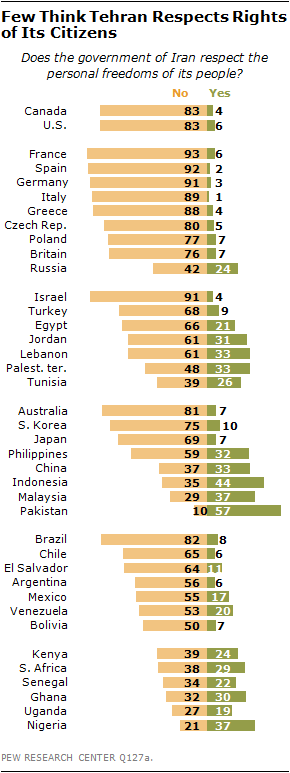Pew Study Finds Broad International Disapproval of Iran’s Human Rights Record
 As Iran’s president-elect Hassan Rowhani prepares to take office in Tehran, he faces growing international concerns about the lack of personal freedoms in Iran. According to a new study by the Pew Research Center released on June 11, 2013, majorities in most of the countries polled asserted that Iran does not respect the rights of its citizens.
As Iran’s president-elect Hassan Rowhani prepares to take office in Tehran, he faces growing international concerns about the lack of personal freedoms in Iran. According to a new study by the Pew Research Center released on June 11, 2013, majorities in most of the countries polled asserted that Iran does not respect the rights of its citizens.
While Western diplomacy remains almost exclusively focused on the issue of Iran’s nuclear program, citizens across the world are increasingly concerned by violations of human rights in Iran. The Pew study, Global Views of Iran Overwhelmingly Negative, surveyed respondents in 39 nations from March 2 to May 1, 2013. Of the 39 countries polled, majorities in 24 countries—and pluralities in 4 additional countries—agreed with the view that “the government of Iran does not respect the personal freedoms of its people.”
In Latin America, half or more of the respondents in the seven countries Pew surveyed agreed that the government in Tehran does not observe or protect the rights of Iranians. In Brazil, 82% of respondents held this view; in Chile the figure was 65%, and in Argentina and Mexico, respectively, 56% and 55%. In Venezuela, one of Iran’s closest allies, 53% of respondents agreed.
Majorities in most nations surveyed in the Middle East and North Africa also disapproved of Iran’s rights record, with 66% of Egyptians, 61% of Jordanians, and 61% of Lebanese stating that Tehran does not respect the rights of citizens. In Iran’s neighbor Turkey, a clear majority (68%) of respondents to the Pew study agreed that Iran’s people lack personal freedoms.
Strong majorities asserting that Tehran does not respect personal freedoms also emerged in countries in the Asia-Pacific region: 81% of Australians, 75% of South Koreans, 69% of Japanese, and 59% of Filipinos held this view.
Overall, the study noted, “Compared with six years ago, unfavorable views of Iran have intensified in a number of countries,” citing double-digit increases since 2007 in Egypt, Jordan, the Palestinian territories, South Korea, Turkey, and Spain.






